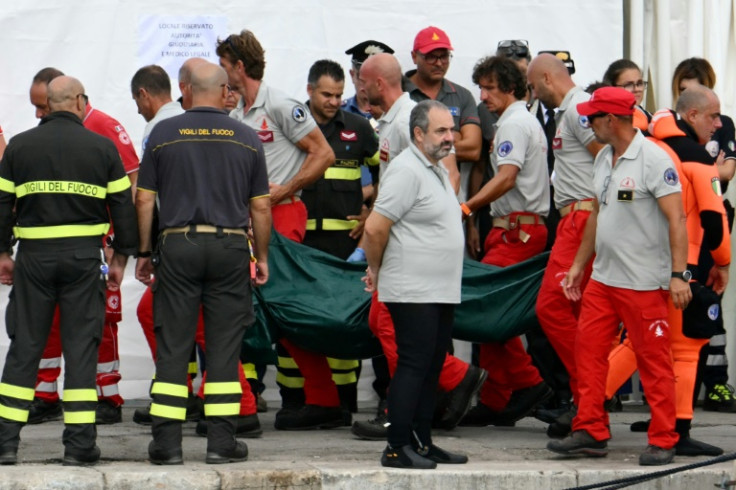
Divers searching for six missing people following the sinking of a superyacht off Sicily have found four bodies, a source close to the search told AFP Wednesday.
The discovery brings the confirmed death toll from the disaster off the Italian island to five, after the body of a man believed to be the yacht's chef was recovered hours after the sinking on Monday.
There were no immediate details about the bodies found. UK tech tycoon Mike Lynch and his teenage daughter Hannah are among the six people missing.
The 56-metre (185 feet) British-flagged "Bayesian" had been anchored some 700 metres off Porticello when it was struck by a waterspout -- akin to a mini-tornado -- during a pre-dawn storm.
It sank within minutes.
Fifteen people were rescued, including Lynch's wife and a woman with a one-year-old baby.
But the tech entrepreneur and his daughter, his lawyer Christopher Morvillo and his wife Neda, and Jonathan Bloomer, the chair of Morgan Stanley International, and his wife Judy, were all reported missing.
Shortly before the news emerged of the bodies found, an AFP reporter saw more than half a dozen boats leave the port of Porticello all within minutes of each other.
Some of them later returned with body bags then carried by emergency service workers into a tent on the quay.
Firefighters had earlier said that searching the yacht, which is largely intact and resting on the seabed some 50 metres down, was a "long and complex" operation.
Despite eyewitness testimonies that the 75-metre mast had snapped, reports on Wednesday suggested that it too survived the incident.
The passengers were guests of Lynch -- an entrepreneur sometimes referred to as Britain's Bill Gates -- to celebrate his acquittal in a massive US fraud case.
The 59-year-old was acquitted on all charges in a San Francisco court in June after he was accused of an $11 billion fraud linked to the sale of his software firm Autonomy to Hewlett-Packard.
Among the survivors was Charlotte Golunski, board director of a company founded by Lynch, who has described how she briefly lost hold of her one-year-old daughter before grabbing her again. Both were plucked to safety.
Fabio Genco, a member of the Palermo Emergency Medical Services who was among the team that treated the child, described the "apocalyptic" situation he found on arriving at the scene.
"The word that the mother and all the injured kept repeating was 'darkness', the darkness that they experienced during the shipwreck," he told the BBC's Newsnight programme.
"They spoke of about five minutes, maybe from three to five minutes, from the moment the boat was lifted, raised by the waves of the sea, until it sank."
He said the survivors rescued had been in shock: "There were truly apocalyptic scenes where everyone was searching and hoping to find the people who at that moment, were not present or just missing."
All the survivors treated in hospital have been discharged, he confirmed.
The speed with which the yacht sank, and the fact that other boats around it were unaffected, was extraordinary.
Some key questions remain, including whether the keel, which provides a counterbalance to the towering mast, was down when the storm hit.
Italian authorities have opened an investigation into what happened and are interviewing all the survivors, including captain James Cutfield, a 51-year-old New Zealander, according to Italian media.
Matthew Schanck, from the Maritime Search and Rescue Council, told AFP what happened was a "pretty unprecedented", describing it as a "black swan event" -- something that is unlikely, but has a big impact.
UK meteorologist Peter Inness described a waterspout as a "narrow column of rotating air below a thunderstorm that occurs over water".
Like tornadoes, they suck up air in a rotating motion. Many are fairly inconsequential, but some can pack winds of more than 100 kilometres (62 miles) per hour, said Inness.
Jean-Marie Dumon, a former naval officer now with the GICAN, the French maritime industry association, added that conditions with winds of 100kph or more can "create completely anarchic sea conditions which can cause capsizing".









